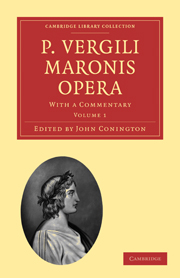ON THE LATER BUCOLIC POETS OF ROME
Published online by Cambridge University Press: 07 September 2010
Summary
If bucolic poetry found no cultivators at Rome before the time of Virgil, it does not seem to have enjoyed much more popularity afterwards. Wernsdorf (Poetae Latini Minores, vol. 2, praef. pp. vi, vii), who wonders that it should not have flourished more among a people originally sprung from shepherds and preserving the recollection of their origin by annual festivals, and inclines to lay the blame on the luxurious temper of the great city, as being naturally antagonistic to a taste for rustic simplicity, is sufficiently explicit in his testimony to the fact, stating that no trace can be discovered of the existence of any bucolic writer earlier than Calpurnius, while the pastoral poets of a later period, with the exception of Nemesianus, who, in his view, as we shall see, is not really one of them, are inelegant and hardly worth reprinting. Calpurnius and Nemesianus themselves cannot be said to stand high in the list of post-Augustan authors; but as they happen to fall within the classical period, as commonly understood, and conform more closely than their successors to the Theocritean or Virgilian type in the treatment of their subject, perhaps a brief account of them may not be unacceptable.
At the outset we are met by a critical question, affecting the authorship of the works which bear their name. These amount jointly to eleven pastorals, most of them averaging less than one hundred lines. All of them were assigned by the five first editions, following the majority of the MSS., to a single writer, T. (or, as the first edition gives it, after one MS., C.) Calpurnius Siculus.
- Type
- Chapter
- Information
- P. Vergili Maronis OperaWith a Commentary, pp. 108 - 117Publisher: Cambridge University PressPrint publication year: 2010



